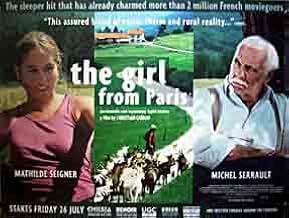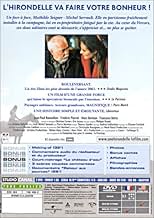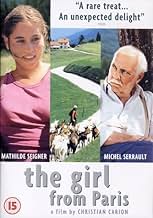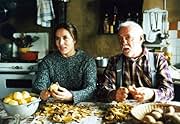VALUTAZIONE IMDb
6,6/10
2522
LA TUA VALUTAZIONE
Sandrine, una donna sulla trentina, si stanca della vita a Parigi e decide di lasciare il lavoro con i computer e diventare una contadina.Sandrine, una donna sulla trentina, si stanca della vita a Parigi e decide di lasciare il lavoro con i computer e diventare una contadina.Sandrine, una donna sulla trentina, si stanca della vita a Parigi e decide di lasciare il lavoro con i computer e diventare una contadina.
- Regia
- Sceneggiatura
- Star
- Premi
- 3 vittorie e 2 candidature totali
Recensioni in evidenza
Sandrine, a parisien girl, fed up with her unfulfilling existence as a computer trainer and the everyday problems of city life decides to leave the Paris to become a peasant farmer.
Sandrine buys a farm high on the Vercors plateau in South-East France from Adrien, an old peasant suspicious of Sandrine's college ideas. It's spring and Sandrine makes a good start, developing other aspects of the farm, a rural Gite welcomes travellers and school parties and a Web sites advertises goat's cheese.
Although the locals are suspicious they are perhaps more accepting of a young, dynamic outsider free of the petty local rivalries that set family against family in these close knit rural communities. This is no Jean de Florette and is illustrated when Adrien defends the changes Sandrine has made to his mates in the village bar.
However the rural idyll is not all that it might seem to city folk. The audience is confronted with graphic scenes of a pig having its throat cut to make Boudin (black pudding) and later of mad cows being killed with a bolt gun. Winter comes and the sense of despair and isolation felt by many small farmers is complete when we see Sandrine in long shot, alone in the barn after one of her goats has stillborn kids.
The film explores the conflicts between conformable but ultimately pointless city life - going nowhere in the Paris traffic and the savage beauty of life on the isolated Vercors plateau. Even the peasants shop at the local hypermarket in Grenoble.
Adrien's initial scepticism gives way to a hope that Sandrine will carry on his farm but he has difficulty with the rapprochement, perhaps caused by events in his own life. The Nazis burned his farm in '44 looking for maquisards and later Government men arrive to kill and burn his cattle infected with mad cow disease. Are the government men worse than the Germans? For Adrien maybe, as these events lead to the death of his wife.
Like the Vercors, Sandrine seems both beautiful but uncompromising but we see constant flashes of the temperament that, like the weather vane in front of her house, cause her to make sudden changes affecting those around her. She is really quite vulnerable needing the occasional love of her city boyfriend and the friendship of Adrien. Maybe it is this qualities that will lead to her eventual success?
A final comment, like many movies these days there is quite a bit of product placement - Volvo cars, Lowe mountain gear, Carrefour but the countryside is wonderfully shot.
Sandrine buys a farm high on the Vercors plateau in South-East France from Adrien, an old peasant suspicious of Sandrine's college ideas. It's spring and Sandrine makes a good start, developing other aspects of the farm, a rural Gite welcomes travellers and school parties and a Web sites advertises goat's cheese.
Although the locals are suspicious they are perhaps more accepting of a young, dynamic outsider free of the petty local rivalries that set family against family in these close knit rural communities. This is no Jean de Florette and is illustrated when Adrien defends the changes Sandrine has made to his mates in the village bar.
However the rural idyll is not all that it might seem to city folk. The audience is confronted with graphic scenes of a pig having its throat cut to make Boudin (black pudding) and later of mad cows being killed with a bolt gun. Winter comes and the sense of despair and isolation felt by many small farmers is complete when we see Sandrine in long shot, alone in the barn after one of her goats has stillborn kids.
The film explores the conflicts between conformable but ultimately pointless city life - going nowhere in the Paris traffic and the savage beauty of life on the isolated Vercors plateau. Even the peasants shop at the local hypermarket in Grenoble.
Adrien's initial scepticism gives way to a hope that Sandrine will carry on his farm but he has difficulty with the rapprochement, perhaps caused by events in his own life. The Nazis burned his farm in '44 looking for maquisards and later Government men arrive to kill and burn his cattle infected with mad cow disease. Are the government men worse than the Germans? For Adrien maybe, as these events lead to the death of his wife.
Like the Vercors, Sandrine seems both beautiful but uncompromising but we see constant flashes of the temperament that, like the weather vane in front of her house, cause her to make sudden changes affecting those around her. She is really quite vulnerable needing the occasional love of her city boyfriend and the friendship of Adrien. Maybe it is this qualities that will lead to her eventual success?
A final comment, like many movies these days there is quite a bit of product placement - Volvo cars, Lowe mountain gear, Carrefour but the countryside is wonderfully shot.
Greetings again from the darkness. Wonderful, subtle French film that displays the nuances of quiet desperation of the young and fear of loneliness and death of the elderly. Make no mistake, the venerable Michel Serrault MAKES this movie! He is downright remarkable as Adrien, the long time farmer, who sells is farm to the young city girl played well by Mathilde Seigner. Many excellent scenes including awkward moments for all. The ridiculous comments about cruelty to animals during the filming is not worthy of mention. This is a fact of life on a farm and obviously the cow scenes were real life - not created for the film. The pig scene, may be painful to watch, but effectively makes the point of life and death on a farm - just like the goat birth scene. As far as the rabbit, give me a break, we see a live bunny and then one being prepared for dinner. This can happen in any restaurant on a daily basis. Yes the hang glider was a bit too much, too often, but I loved the Volvo, the Weimeramer and the "dumb" goat. Very personal film with much insight into human nature at all ages.
It's formulaic, of course, but the trick with formulas is to act as if they're NOT formulaic and play it as if it were the most original story that ever came down the Pike. And that's what we get here, a charming, dazzling and ultimately Moving film that explores as if for the first time age-old concerns. Serrault has been here before in Nelly and Monsieur Arnaud so this is a good time to deal with the six degrees of separation aspect. In 'Nelly' Serrault was the older man and Manu Beart the younger woman; in Manon des Source Manu Beart tended goats and here Mathilde Seigneur does the same thing. So much for trivia. They really put more than the usual five minutes thought into this one because the credits come up over breathtaking aeriel shots of the Vercours and you can see why so many English people are inspired to buy second homes in France or even move there entirely. This is reinforced when in the first sequence we cut to Sandrine (Seigneur) caught up in a traffic jam in Paris and looking thoughtfully at a travel poster of Vercours on a bus in front of her. This is economical storytelling and in the very next scene she is telling her mother of her decision to move to the Vercours - in the Rhone Alps - and become a goat-farmer. The mother can't understand, natch, why a girl born and bred in Paris and a successful computer instructor would want to give it all up to become a sort of recluse about town. So we get the argument out of the way in the first reel. Sandrine is a gifted student, one of the best in Agricultural school and soon she is ready to invest 450,000 Francs in a remote goat farm. The farm belongs to old Adrien (Michel Serrault) and he comes with it, at least til he can move into his new flat in Grenoble some 18 months away. We are now ready for the classic battle of Old versus New, Young versus Old, initial antagonism giving way to mutual affection. Like I said, we've seen it all before. But what we HAVEN'T seen before is two Class Acts like Serrault and Seigneur and what they serve up is pure DELIGHT. We are spared nothing, this isn't a Travelogue because after an idyllic Summer comes the Winter of Discontent, so bad that Seigneur seriously considers throwing in the towel. Essentially a two-hander that stands or falls by the the quality of the two pricipals it is also fleshed out with really strong support in the shape of Adrien's neighbor and contemporary, Sandrine's colleague from Paris and sometime lover, and her mother. This is the kind of movie that Hollywood has completely forgotten how to make and which the accountants who run the place wouldn't sanction anyway. Thank God the French and other European countries can still turn them out like this. 10/10
a slow tempo movie, with no big scenes, no breathtaking special effects, just a small number of actors and the peaceful scenery of the French alps that touch the heart. all these are the background of the slow development of the relationship between the 2 main characters of the story. Sandrine, a young Parisian woman, who decided to leave the big city and buy a farm at the French alps. Adrian is the old owner of the farm, who remained living at the farm after the sale, but at first, refuses to help Sandrine and guide her. the peaceful yet cruel nature is the background of the mutual process that the two characters experience. the old man and the young woman who learn to accept each other and even like each other very much.
'Une hirondelle a fait le printemps' ('The Girl from Paris') weaves its French spell in the manner of the great French filmmakers, and yet this 2001 film was the debut of the man - Christian Carion - who later gave us the tremendously well-done 'Joyeux Noël' in 2005. This story (written by both Carion and Eric Assous) is unique, a study of human desires, needs, and compromises that is more human in feeling than most any other film this reviewer has seen.
Sandrine Dumez (Mathilde Seigner) lives in Paris where she slaves away at teaching computer science to students in tune with the age. She is attractive, successful, popular...and unhappy. She longs to fulfill the dreams of her childhood and become a farmer. Much against her doting mother's advice she enrolls in a school for agriculture and eventually graduates as one of the top students, winning the ability to buy a farm in the Rhone Alps. The snag: the elderly crusty owner Adrien (Michel Serrault), who wants to sell his farm yet maintain his idyllic country existence without the wear and tear of farming, refuses to move off his own property once the contract is signed for Sandrine to take over the land. Sandrine allows Adrien to stay, makes the farm not only succeed despite her novice status, but also adds a hotel ('The Balcony of the Sky') to enhance her income from her goat farm whose chief product is cheese. Encouraging the transition is the jovial neighbor Jean (Jean-Paul Roussillon) whose recent selling of his own farm allows him to travel around in his new Volvo with his trusty (and hilarious) dog Pharaoh. Jean warns Sandrine that when winter come Adrien will become a recluse (remembering the loss of his wife, the Nazi decimation of the French farms, his losses from mad cow disease in the past, etc), yet Sandrine persists - until the winter comes and all but defeats her optimism. Events bond Adrien and Sandrine more closely, so much so that when Sandrine returns to Paris for a much-needed breather - and liaison with her ex-boyfriend Gérard (Frédéric Pierrot) - Adrien discovers how important to him Sandrine has become. The ending is tied into a surprise that touchingly resolves many doubts and questions and allows the viewer to finish the story on his own! The cast is superb, with special kudos to Michel Serrault, a consummate actor. The cinematography of the glorious farm location is by Antoine Héberlé and the very French musical score is by Philippe Rombi. The film is a delight in every aspect and one that deserves repeated viewings. Grady Harp
Sandrine Dumez (Mathilde Seigner) lives in Paris where she slaves away at teaching computer science to students in tune with the age. She is attractive, successful, popular...and unhappy. She longs to fulfill the dreams of her childhood and become a farmer. Much against her doting mother's advice she enrolls in a school for agriculture and eventually graduates as one of the top students, winning the ability to buy a farm in the Rhone Alps. The snag: the elderly crusty owner Adrien (Michel Serrault), who wants to sell his farm yet maintain his idyllic country existence without the wear and tear of farming, refuses to move off his own property once the contract is signed for Sandrine to take over the land. Sandrine allows Adrien to stay, makes the farm not only succeed despite her novice status, but also adds a hotel ('The Balcony of the Sky') to enhance her income from her goat farm whose chief product is cheese. Encouraging the transition is the jovial neighbor Jean (Jean-Paul Roussillon) whose recent selling of his own farm allows him to travel around in his new Volvo with his trusty (and hilarious) dog Pharaoh. Jean warns Sandrine that when winter come Adrien will become a recluse (remembering the loss of his wife, the Nazi decimation of the French farms, his losses from mad cow disease in the past, etc), yet Sandrine persists - until the winter comes and all but defeats her optimism. Events bond Adrien and Sandrine more closely, so much so that when Sandrine returns to Paris for a much-needed breather - and liaison with her ex-boyfriend Gérard (Frédéric Pierrot) - Adrien discovers how important to him Sandrine has become. The ending is tied into a surprise that touchingly resolves many doubts and questions and allows the viewer to finish the story on his own! The cast is superb, with special kudos to Michel Serrault, a consummate actor. The cinematography of the glorious farm location is by Antoine Héberlé and the very French musical score is by Philippe Rombi. The film is a delight in every aspect and one that deserves repeated viewings. Grady Harp
Lo sapevi?
- QuizAt one point the farmers tie a bottle to a pear tree and stick a small branch with a blossom inside. They do this so, in a few months, the result will be a full sized pear inside the bottle, much too big to have been put into the bottle in the usual way. One of the farmers uses it to make a bottle of a pear flavored alcoholic drink, with the pear still inside, and the bottle, pear, and drink appear late in the film when the two farmers and Sandrine have a drink together.
- Blooper1:10:30 - Sandrine enters the goat barn. She is not wearing a watch. Few seconds later she assists a goat that gives birth to a lamb. She then is wearing a watch on her left arm.
I più visti
Accedi per valutare e creare un elenco di titoli salvati per ottenere consigli personalizzati
- How long is The Girl from Paris?Powered by Alexa
Dettagli
- Data di uscita
- Paese di origine
- Siti ufficiali
- Lingua
- Celebre anche come
- The Girl from Paris
- Luoghi delle riprese
- Aziende produttrici
- Vedi altri crediti dell’azienda su IMDbPro
Botteghino
- Budget
- 25.000.000 FRF (previsto)
- Lordo Stati Uniti e Canada
- 183.266 USD
- Fine settimana di apertura Stati Uniti e Canada
- 8280 USD
- 23 mar 2003
- Lordo in tutto il mondo
- 12.812.396 USD
Contribuisci a questa pagina
Suggerisci una modifica o aggiungi i contenuti mancanti






















